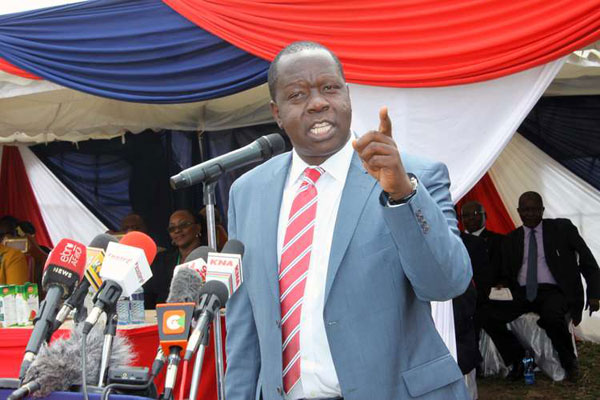Africa/Kenia/Julio de 2016/Daily Nation
Resumen: Los sindicatos de maestros dicen que los disturbios es como resultado de la tensión causada por los cambios bruscos en el calendario escolar. Los maestros han aumentado la presión sobre la educación, el secretario del gabinete de Ciencia y Tecnología (CS) Fred Matiang’i dijo para revisar las nuevas fechas escolares, que han sido citados como la causa principal de la ola de disturbios estudiantiles en las escuelas secundarias de todo Kenia.
Teachers have stepped up pressure on Education, Science and Technology Cabinet Secretary (CS) Fred Matiang’i to review the contested new term dates, which have been cited as the major cause of the wave of student unrest in secondary schools across Kenya.
The Kenya Secondary Schools Heads Association (Kessha) also waded into the issue on Wednesday, absolving its members of blame for school unrest during a meeting with education officials in Nairobi.
The association is expected to meet with the CS on Thursday to look into the issue of school unrest and how best to address it, among other issues.
This comes even as more schools went up in flames, with the latest being Kieni Day and Boarding Secondary School in Tharaka Nithi County, Kiteta Boys Secondary School in Makueni County and Kapchepkor Boys High School in Baringo County.
A police report indicates that students in 122 schools have gone on the rampage in the past 18 months, leading to massive destruction of property worth millions of shillings.
The latest statistics indicate almost 60 cases have been reported this year, while 92 cases occurred last year.
The Kenya National Union of teachers (Knut) and the Kenya Union of Post Primary Education Teachers (Kuppet) insisted that the unrest is as a result of tension caused by the abrupt changes in the school calendar.
Even though they acknowledged that there were cases of student unrest last year, they insisted that the magnitude was not as big as the one witnessed in the last two months.
Knut Secretary General Wilson Sossion asked Dr Matiang’i to embrace dialogue with stakeholders on how best to stem examination cheating.
“It is embarrassing to lose schools infrastructure worth millions of shillings through arson,” said Mr Sossion in a statement.
Kuppet Chairman Omboko Milemba also called on the CS to embrace dialogue and seek the views of other stakeholders “instead of being a lone ranger in finding a solution to the problem”.
Mr Milemba said there is need for a new task force to look at the cause of the unrest conclusively and that the government should not rely on past task forces’ reports, which he said were outdated.
He said the government should consider closing schools to allow students to rest as it pursues the issue.
Kessha Vice-Chairperson Indimuli Kahi said the association will carry out its own investigations to establish the cause of the unrest.
“We want to do our own investigation as an association so that we can understand this problem that seems to be getting out of hand,” said Mr Kahi.
NOT CONDEMNED
However, he insisted that school heads should not be condemned.
At least 12 teachers and sub-county education officials have either been suspended or transferred in three of the schools affected by student riots in Kisii.
Kenya Parents Teachers Association Chairman Nathan Barasa agreed with the teachers, saying the extension of term has contributed to the mess.
However, Mr Barasa blamed school heads, saying there is total breakdown in communication between them and students.
“We must address the high handedness by school heads in schools,” said Mr Barasa.
In May, Dr Matiang’i reorganised the school calendar and announced far-reaching changes in the administration of national examinations to curb cheating.
He banned all social activities in third term—including prayer days, visiting, half term breaks, sports, prize-giving ceremonies and annual general meetings—to cut contact between candidates and outsiders.
To accommodate the changes, term two, which was initially scheduled to end on August 5, was extended to August 12, shortening the holidays to only two weeks from the previous four.
The third term will last only nine weeks from the previous 12, beginning on August 29 and ending on October 28.
However, Dr Matiang’i has dismissed the notion, noting schools have experienced students’ riots even when the school calendar had not been varied.
On Wednesday last week, Dr Matiang’i met members of the Education Committee in the National Assembly to discuss the school unrest. His meeting with Senate committee on Tuesday this week was postponed.
Foto: The Cabinet Secretary for the Ministry of Education, Science and Technology, Fred Matiang’i, speaks at Ngara Girls High School in Nairobi on June 30, 2016. PHOTO | ANTHONY OMUYA | NATION MEDIA GROUP
Fuente: http://www.nation.co.ke/news/all-eyes-on-matiangi-new-term-dates-blamed-for-unrest/-/1056/3293842/-/108eco4/-/index.html







 Users Today : 49
Users Today : 49 Total Users : 35459955
Total Users : 35459955 Views Today : 56
Views Today : 56 Total views : 3418521
Total views : 3418521